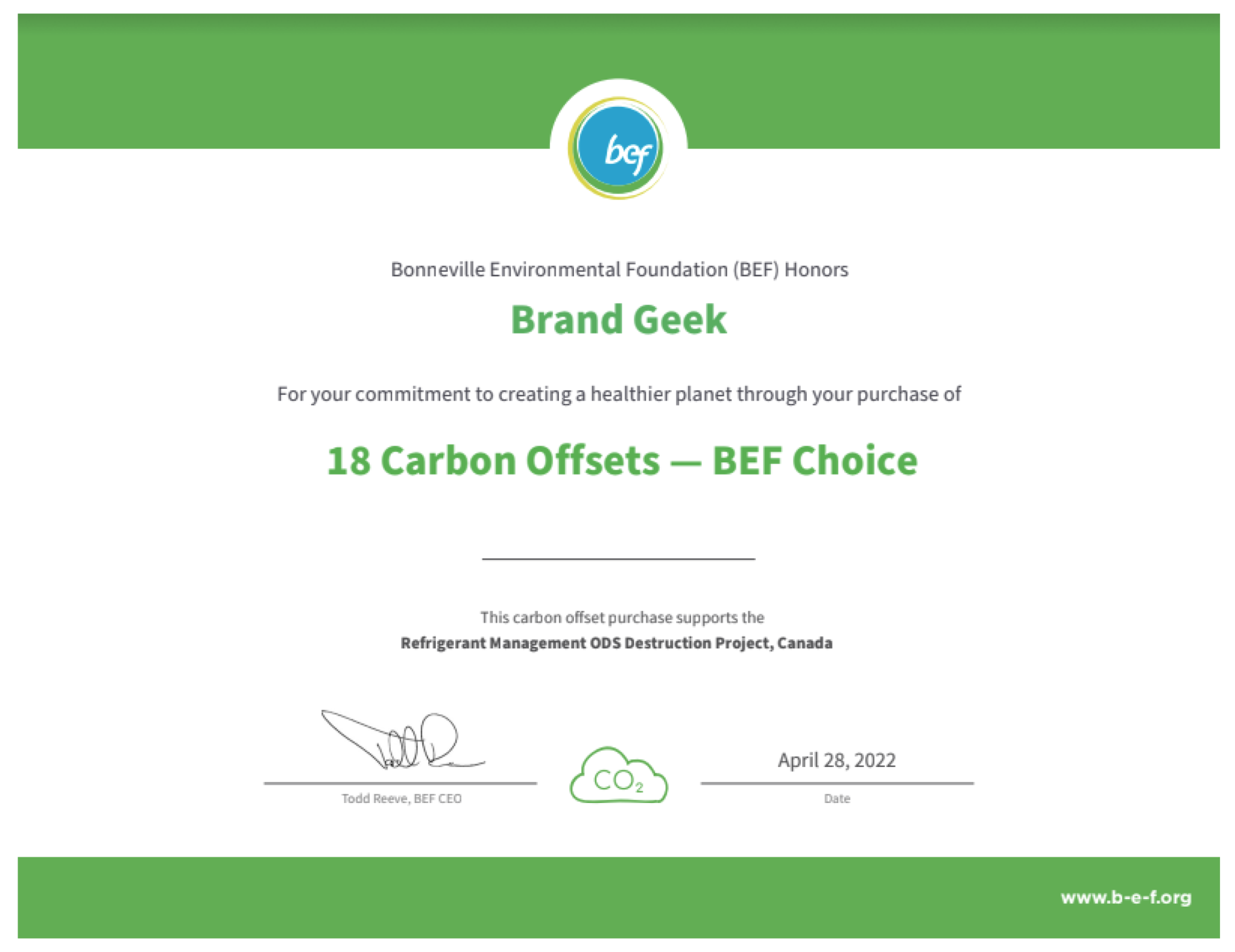Brandgeek proudly supports Mountain Area Preservation and is humbled to be…
Geekview IP Weeks(ish) in Review
Fake flavor packets fuel legal fury.

Tropicana — No pulp, but plenty of litigation. In my 2012 Geekview New Year’s edition, I wrote about a federal class action lawsuit recently filed in New Jersey against Tropicana by Dennis Lynch for calling their not-from-concentrate/never-from-concentrate (“NFC”) juice “100% Pure & Natural.” Meanwhile, across the country in California, a gal named Angelena Lewis wants to lynch Tropicana for the same thing: “falsely claiming that it’s heavily processed, designed and modified “not-from-concentrate” orange juice (“NFC juice”) is 100% pure and natural orange juice.” Stepping it up a notch, Ms. Lewis sued not only for violation of California and federal unfair competition laws, but also under the laws of the states of Alabama, Alaska, Arizona, Arkansas, Colorado, Connecticut, Delaware, D.C., Florida, Georgia, Hawaii, Idaho, Illinois, Indiana, Iowa, Kansas, Kentucky, Louisiana, Maine, Maryland, Massachusetts, Michigan, Minnesota, Mississippi, Missouri, Nebraska, Nevada, New Hampshire, New Mexico, New York, New Jersey, North Carolina, North Dakota, Oklahoma, Oregon, Pennsylvania, Rhode Island, South Carolina, South Dakota, Tennessee, Texas, Utah, Vermont, Virginia, Washington, West Virginia, Wisconsin and Wyoming. That’s every state but Ohio, and in alphabetical order! (As a native Ohioan, I really wonder why that is.) One false advertising class action lawsuit per coast, Tropicana has its hands full. And in other beverage IP news . . .
Gallo’s red in the face over fake wine.

According to an article on Decanter.com — self-described as “quite simply – the world’s best wine magazine” (but lacking an ego, apparently) — Gallo and Constellation agreed to pay $2 million in settlements to California consumers who were “duped in the notorious fake Pinot Noir scandal.” In case you too almost missed the Pinogate scandal, Decanter wrote about it here, here, here and here. Caught selling fake Pinot Noir (or is it Pinot No) Gallo and Constellation were served up a class action lawsuit to go with the fake Pinot they bought from several French wine producers who since have been jailed or fined for their dubious bottling behavior. Although the winemakers denied wrong doing claiming they were duped, they agreed to issue refunds to consumers who bought the poseur Pinot. What’s the opposite of a poseur? Digital Music News!
Digital Music News tells Escape Media Group to shove it.
Digital Music News (DMN) was served with a subpoena by Grooveshark on January 15, 2012 seeking information regarding anonymous comments posted in October, 2011 by posters who identified themselves only as Grooveshark employees. Grooveshark is being sued by UMG and other record labels for copyright infringement based on Grooveshark’s business model. DMN’s Publisher & Founder, Paul Resnikoff, responded “to Grooveshark’s army of attorneys via email, FedEx letters, and this posting” on January 20, 2012. The posting is the company’s formal response to Grooveshark’s subpoena. The letter acknowledges that its recipients “are among the most expensive and talented attorneys in the world,” while firmly stating that DMN refuses to be intimidated by them. (You go, DMN — DMN must stand for Damn, you stood up to the record labels!) Mr. Resnikoff first explains why he cannot comply with the subpoena’s request for information about anonymous commenters, which info is purged 24-48 hours after the comment is published. He then poignantly describes what the First Amendment‘s guarantee of freedom of the press means to him and his media company. Writing as journalist and not as a lawyer, Resnikoff didn’t miss a beat in calling Grooveshark’s intimidation tactics for what they are. Grooveshark probably didn’t expect Resnikoff to arm himself with California’s Shield Law, which protects journalists against having to reveal confidential sources and unpublished information. Given DMN’s public and seemingly legally superior argument, I wonder if Grooveshark will stay at bay or come back teeth snarling. If a Ninja snarls his teeth, will anyone notice?
Video ninja nabbed in copyright sting.
Even ninjas can’t hide from the MPAA! The now infamous website NinjaVideo had a brief life on the internet from February, 2008 till June 30, 2010 when it was shuttered by the Feds as part of its ongoing Operation In Our Sites. NinjaVideo was an internet portal that contained links to unauthorized displays of TV shows, documentaries and movies, of course. NinjaVideo was one of the most popular internet video portals when it was shut down in June, 2010. According to an article on TorrentFreak, Matthew Smith, an administrator of NinjaVideo was required to pay back (to whom, I wonder) the $172,000 he made from the infringement, as well as sentenced to 14 months in federal prison, plus 2 years’ supervised release. See kids? Copyright crime doesn’t pay. Apparently, however, it pays to be a famous newborn at the US Trademark Office . . .
BLUE IVY CARTER NYC Application filed, examined and abandoned all before the baby is 3 weeks old!
In what world do parents name their kid Blue Ivy? That could only happen in a world where a reputable media outlet devotes an entire webpage to the child, which could only happen in a world where a U.S. Federal trademark registration application for the child’s name gets filed, examined and abandoned all in 11 days. Why, this world looks a lot like Hollywood! Not the city, mind you, so much as the mentality. It’s a fabulous world in which stars have such-super-special-status that they float magically to the front of any line, even that of the USPTO where mere mortal’s trademark applications get examined 3-4 months after filing. So what happened here? According to an article on The Smoking Gun, a guy named Joseph Mbeh (poor guy) applied to register the mark BLUE IVY CARTER NYC for infant apparel just a few days after the infant was born to rock stars Beyonce and Jay Z. The USPTO reviewed and refused the application in record time (11 DAYS!!!) since the applicant did not have the requisite Name Portrait Consent of the applicant (as I discussed in depth here). Mbeh then immediately Expressly Abandoned his application. Not to be discouraged, another applicant, CBH By Benton Clothier dba Creative Business House filed an application to register BLUE IVY CARTER GLORY IV for a variety of personal care and scented products. This application claims a first use date of February 14, 2011, which is a bit more mysterious since Blue Ivy Carter was born on January 7, 2012. Wonder how long we’ll have to wait for the disposition of that application. Not as long as we’ve been waiting for Mickey Mouse to fall into the public domain (life + 70 anyone?) . . .
Mickey Mouse + Joy Division = mousepunk madness.
Two weeks ago in Geekview, I wrote about the lawsuit filed by The Velvet Underground against the Warhol Foundation for trademark infringement based on the Foundation’s use of the band’s iconic banana album cover. In that case, the Velvet Underground sought damages and an injunction for trademark infringement and declaratory judgment that the banana copyright is in the public domain. Here we are again, kinda, only this time it’s Disney and Joy Division. According to an article on NME, the shirt was not authorized by the band, though bassist Peter Hook reportedly sees the image as a compliment. Hook apparently confirmed that Disney had not sought consent to use the image, but Hook also stated that the copyright is in the public domain. Disney since removed the shirt from its store to investigate the IP issues further, according to an article on Rolling Stone. The shirt can be found on eBay ranging from $25.00 to $350.00. I wonder why old album art is suddenly en vogue again.
 Stay tuned for this week’s Geekview part two — on Tuesday. There’s so much interesting IP news this week, I thought it best to break it up into 2 posts.
Stay tuned for this week’s Geekview part two — on Tuesday. There’s so much interesting IP news this week, I thought it best to break it up into 2 posts.









Comments (0)